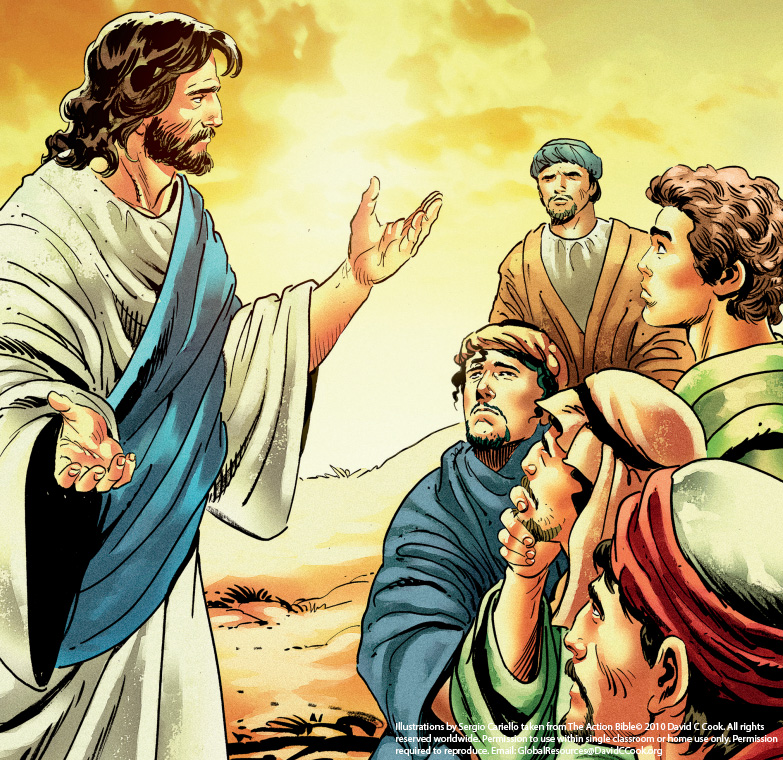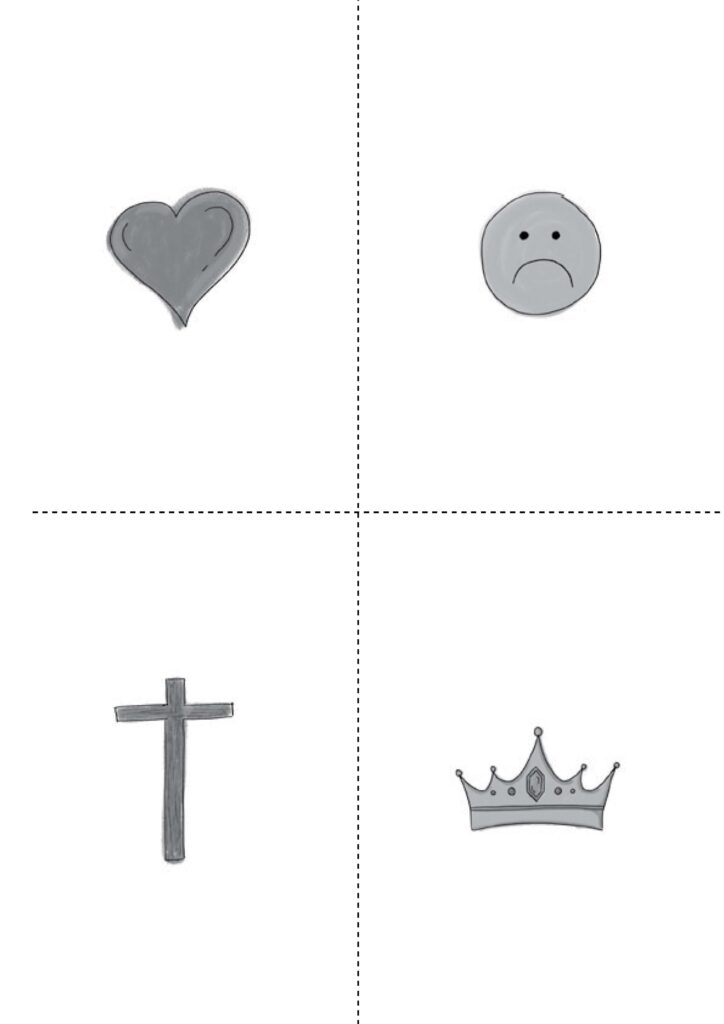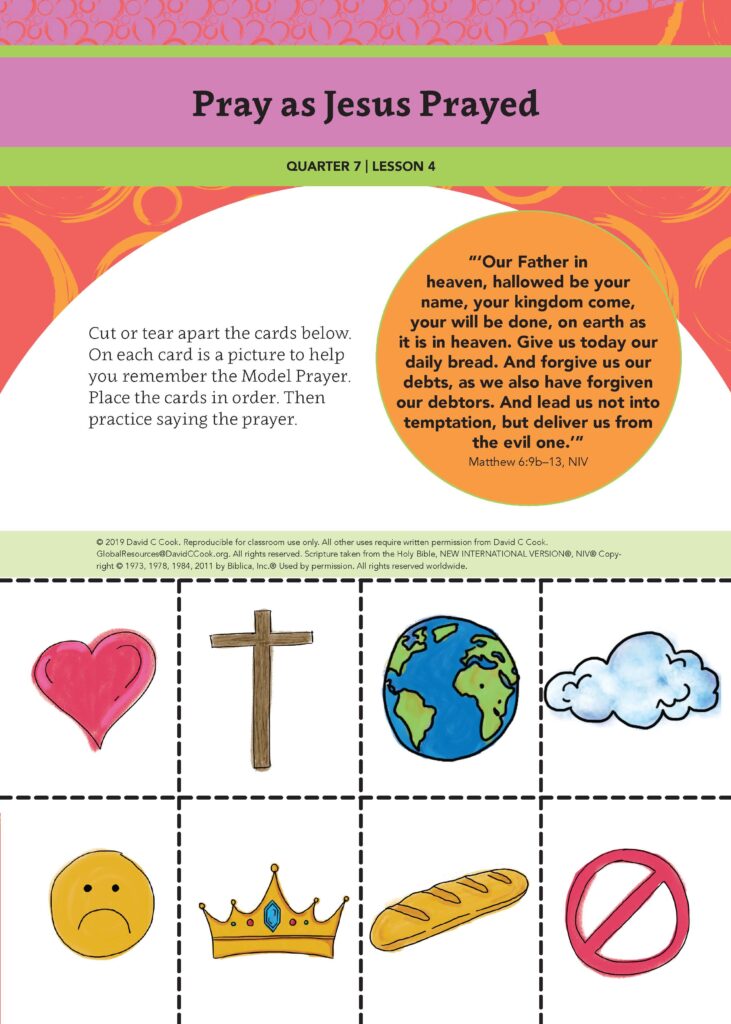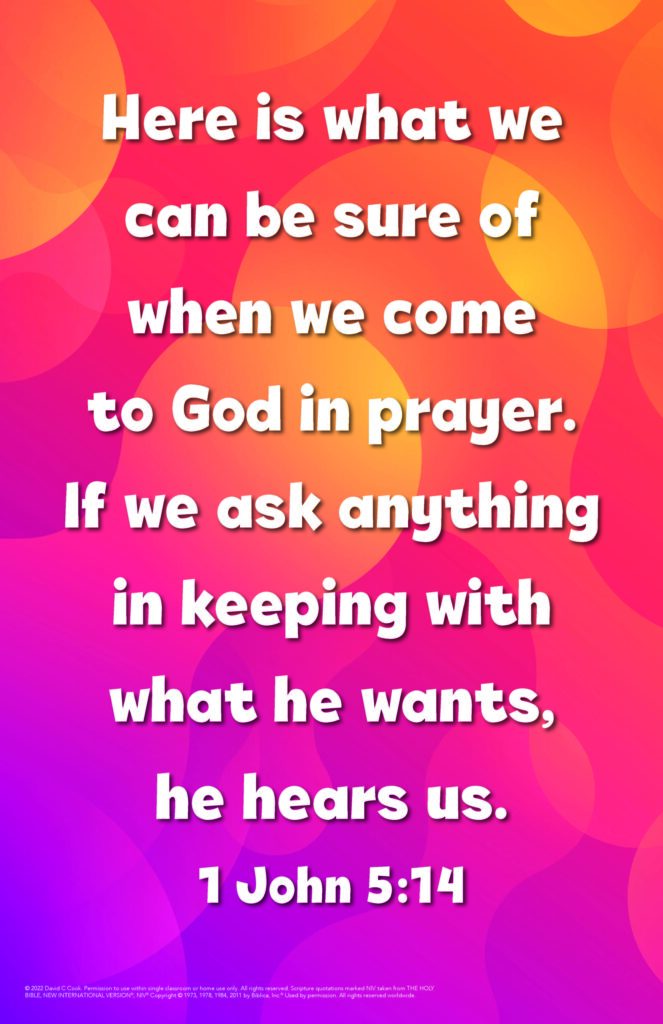During the lesson, the information for you to know is written in regular type, and what we suggest speaking or reading aloud to children is in bold. All resources for this lesson, including the Teacher Guide, Student Page, Family Connection Card, and other resources can be downloaded in a ZIP file by clicking on the following link:
In some lessons you will find "resource articles." These are articles written by experts from around the world to help equip you for your work with children and adolescents. Share them with parents or guardians if you consider it appropriate.
Before class, place all of the stones into 1 bag. Place all of the pictures from the tear–out pages from Lesson 3 in another bag. Make sure to include the pictures you used for Lesson 3. You will need both bags for the Teaching section of the lesson.
Give us today our daily bread.
Matthew 6:11, NIV
We all have needs. Food is necessary for all living things, not just humans. If we do not eat every day, our bodies feel tired and weak. If we do not have what we need, we can feel angry, sad, or even hopeless. Jesus taught us to pray for daily bread. Praying for daily bread reminds us to pray for both our physical and spiritual needs.
What physical needs do you have? When these physical needs are met, it makes the rest of your life easier. When they are not met, it can be difficult to focus on the good things God has asked you to do. What spiritual needs do you have? Think about what you can do to build your relationship with God. You strengthen your bond with God when you regularly praise Him for who He is and what He has done, ask for your needs and the needs of others, and ask God for His forgiveness. Consider using the Lord’s Prayer in your daily communication with your Father in heaven. It is a great place to start!
Encourage families to say the Lord’s Prayer together to start the day and end the day. Give a copy of the Lord’s Prayer to each of the families if possible.
Teacher Tip: If possible, email or text the Family Connection Card to the families of your students.
As the children enter the teaching space, greet them and give them each a small stick and ask them to sit in a circle.
Each of you has a stick. Place the stick in front of you.
The last time we met, we learned about the Lord’s Prayer. In the first half of the prayer, we praise God for who He is and what He has done. Today, we will learn about the second half of the prayer.
Let’s play a game to help us learn about a part of the prayer. In this part of the prayer, we learn God wants us to ask for the things we need. Think about 1 thing you need.
Raise your hand if you want to share something you need.
Allow 3–4 children to respond.
Everyone needs food, water, and other physical things to live. Did you know that you have spiritual needs as well? These might include spending time with God, giving and receiving care and love, and feeling safe.
Think about the need you named a moment ago. Raise your hands if you thought of a physical need that you can touch. Great! Hands down. Did anyone think of a spiritual need that you cannot touch? Very good—put your hands down.
In a moment, I will say a type of need you may have. If you hear the need you thought of, leave your stick and come stand in the middle of the circle. When I say, “Our daily bread,” everyone standing in the middle will race to sit by any stick left in the circle. You do not have to sit in where you are sitting now.
Let’s add something to this game to make it a bit more challenging. When a group gets up to stand in the middle of the circle, I will take 1 stick away from the circle. This means 1 person will be left standing at the end of the game. This person will then have to try to sit by a stick with the next group.
Call out a need, such as “food.” The children who thought of a food need will come to the middle of the circle. Remove a stick from the circle. Then say, “Our daily bread.” The children will race to sit in one of the spaces in the circle designated with a stick. Continue playing 2–3 more times. The following are other needs you may choose to call out:
After the game, have the children sit in their normal seats for the lesson.
That was fun! You learned that we all have 2 kinds of needs—physical needs that we can touch and spiritual needs that we cannot touch. Let’s find out how this relates to the Lord’s Prayer.
Optional: If possible, share the image from The Action Bible.

Pick up the bag of prayer pictures. Hold up the bread picture for the children to see. Read this verse directly from your Bible.


Listen to this part of the Lord’s Prayer:
Give us today our daily bread.
Matthew 6:11, NIV
Allow 2–3 children to respond.
The bread we eat every day to give our bodies energy to live and grow could be what is meant by daily bread. But this also means so much more! Listen to what Jesus said about bread.
Jesus answered, “It is written, ‘Man must not live only on bread. He must also live on every word that comes from the mouth of God.’ ”
Matthew 4:4
As people, we need food, but we also need God. The bread in this verse represents our physical and spiritual needs. When you talk to God and listen to God, your relationship with Him becomes stronger and healthier. When we ask God to give us our daily bread, we are asking Him to give us what we need both physically and spiritually.
The next part of the Lord’s Prayer talks about what we want God to do for us when we do something wrong. It is the “tell” part of the prayer. Listen carefully to these words from the Bible:
Hold up the picture of the frowning face from the bag of prayer pictures.
And forgive us our sins, just as we also have forgiven those who sin against us.
Matthew 6:12
Who remembers what a sin is?
Allow 1–3 children to respond.
A sin is something we do or think that goes against what God wants. For example, if I lie to my friend, that is a sin. God does not want us to lie. He wants us to tell the truth.
Name something you think is wrong to do.
Answers may include: stealing, hurting people without a reason, killing, saying mean words, and similar responses.
When you do something wrong, this is a sin. When you believe in God and you believe that Jesus died for your sins, you can ask God to forgive your sins, and He will. When someone does something wrong that hurts you, you can also ask God to forgive him for sinning against you.
The next part of the Lord’s Prayer asks God to help us to not want to sin and to keep us safe from evil. It says:
Hold up the “no” sign from the bag of prayer pictures.
Keep us from sinning when we are tempted. Save us from the evil one.
Matthew 6:13
Temptation is a big word. Temptation is a situation in which you must either choose to do what God would want you to do or choose to go against God. Maybe you are tempted to steal something that does not belong to you. Often, doing the wrong thing may seem easier or more exciting. But that does not make it right.
This part of the prayer also asks God to save us from the evil one. The evil one is the devil, and he is where evil comes from. He is where sin comes from. The devil goes against God, and he encourages us to go against God.
Allow 2–3 children to respond.
When you pray these words, you are asking God to help you to do what is right. You are asking Him to keep you from sinning when you are tempted to do what is wrong.
Sometimes, we can be tempted with something we really want or need. Maybe we are tempted to steal food because we are hungry. Maybe we are tempted to lie to get what we want. We all give in to temptation at times, but when we pray to ask God to keep us from being tempted and keep us from evil, we ask for His help in doing what is right.
Listen to these Bible verses that put together all the parts of the Lord’s Prayer we learned today.
Give us today our daily bread. And forgive us our debts, as we also have forgiven our debtors. And lead us not into temptation, but deliver us from the evil one.
Matthew 6:11–13, NIV
Let’s say this part of the prayer together. I will pause after each part, so you can repeat what I have said.
Repeat the words with the children again.
In the last part of the prayer, we praise God once again, saying:
For thine is the kingdom, and the power, and the glory, forever. Amen.
In this part of the prayer, we declare that God’s kingdom will last forever, He is powerful, and He is to be forever glorified. We are praising God for who He is. Let’s learn a few motions and say this part together:
Amen (pause).
Repeat this part of the prayer with the children 3 times.
Optional: If you are using Student Pages, have children practice arranging the pictures.

Let’s put all of the parts of the Lord’s Prayer together to help us learn this important prayer! I need 8 volunteers to hold pictures of the prayer for us.
Pick up the bag with the Lord’s Prayer pictures. Choose 8 children to come up with you. Ask them each to choose 1 picture from the bag. Ask the volunteers to stand in any order with their pictures facing the rest of the class.
Now, you will all help put these pictures in the correct order. As we say each line of the prayer, you may raise your hand and tell me which picture matches that part of the prayer.
As the children name which picture goes with each part of the prayer, move the children holding the picture so that they are in the correct order from left to right as seen by the rest of the class. If you are using the Memory Verse Poster, show it to the students.
Great! Now that we have all of the pictures in order, let’s say the prayer together a few times. I will stand behind the person holding the picture that reminds us of each part of the prayer. I will continue moving to each picture as you pray.
If you use the Memory Verse Poster, show it to the students.
This is the confidence we have as we approach God: that if we ask according to his will, he hears us.
1 John 5:14

Say the prayer 3 times with the children. As they say each part of the prayer, stand behind the child holding each picture. If your church says the last part of the prayer, include this by doing the motions with the children.
End class by saying this blessing, based on Matthew 6:11–13, over the children.
Blessing: May you know you can come to God and ask for what you need. May you ask God for forgiveness when you need it, and may He keep you safe from evil.
Lead the children in singing this quarter’s song, if possible.
Life on Life ©2020 David C Cook. Reproducible for home or classroom use only. All other uses require written permission from David C Cook [email protected]. All rights reserved.